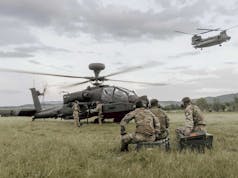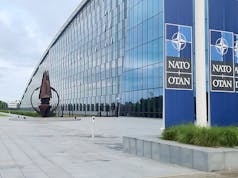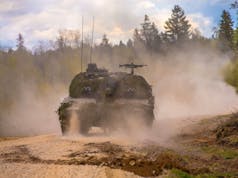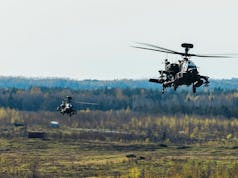Ukraine: Russia’s losses mount – but self-sacrifice in war is part of the country’s mythology.
A recent intelligence report published by the UK’s Ministry of Defence about Russia’s attempt to capture the town of Avdiivka in the Donetsk region is the latest illustration of just how much the conflict in Ukraine is becoming a war of attrition.
Russia’s push to mount a new offensive in the east has resulted in substantive “personnel losses” for its military.
Written by Ben Soodavar, Researcher, Department of War Studies, King’s College London. This article is the opinion of the authors and not necessarily that of the UK Defence Journal. If you would like to submit your own article on this topic or any other, please see our submission guidelines.
In the west, many assume that every inch of Ukrainian land that is liberated brings Russia closer to military defeat and Europe to peace. But Russia has adapted to both internal and external shocks. As of August, it was estimated that Russia had suffered “as many as 120,000 deaths”.
That number will have risen in recent weeks. And as the death toll climbs, the ability to replace troops becomes as important as military equipment and technology.
Latest Defence Intelligence update on the situation in Ukraine – 17 October 2023.
Find out more about Defence Intelligence's use of language: https://t.co/LRafxn8hYV
🇺🇦 #StandWithUkraine 🇺🇦 pic.twitter.com/96kwVqt4RV
— Ministry of Defence 🇬🇧 (@DefenceHQ) October 17, 2023
Even though many young men left Russia rather than be sent to the front, the country still has a large pool of young men from which to recruit and has claimed to have enlisted a large number without resorting to general conscription – although the Kremlin’s figures have been questioned by other sources.
But the question remains as to how many Russian military deaths is too many for Putin to retain the support of the Russian people. And it’s a very difficult question to answer. In Russia, the notion of military sacrifice plays an important role in informing national identity.
Russia’s national story is constituted by loss. It has lived and continues to live a tale of self-induced suffering. Even just considering the past century, military losses during the second world war and in Afghanistan – followed by the loss of a sense of identity after the collapse of the Soviet empire in 1991 – have all come to define Russia’s character today. The sense of the “loss of empire” is what has driven Vladimir Putin’s foreign adventurism in Georgia and Ukraine.
For the motherland
For the British people, the death of 179 solidiers in Iraq was traumatic enough for leaders to change course. But military sacrifice has a different meaning in Russia, one that is diametrically opposed to the value the liberal west places on the individual subject.
For Russia, every dead soldier in Ukraine constitutes a step towards victory and reclaiming the great power image of the country’s Soviet past. While the west’s liberal philosophy promulgates the importance of individual rights, Russia is defined by a system of collectivism. Within its value system, the individual subject confers prestige through their self-sacrifice for the collective wellbeing.
In Soviet iconography, tropes of self-sacrifice and fatal injury tend to be closely tied to nationalist ideas of pride and superiority. They pervaded propaganda posters during the “great patriotic war”.
Take the image For the Motherland! (1942) by Aleksei Kokorekin as an example. It conveyed Soviet resilience through the portrayal of a wounded soldier fighting on bravely and showing no sign of physical weakness despite his injuries.
This juxtaposition between the injured self and national status is telling. Kokorekin’s depiction of Soviet heroism was also indicative of the Soviet mentality on death – where the emphasis on physical suffering became a source of national superiority.
Spirituality of loss
This logic permeated the consciousness of subsequent generations and in how they interpreted military sacrifice. For her 1990 study Tsinkovye mal’chiki (translated as Zinky Boys) by Nobel prize-winning writer Svetlana Aleksievich, the author interviewed army veterans from the campaign in Afghanistan. She recalled how in one interview an artillery soldier described war as “a spiritual experience”, while referencing the self-sacrifice of the Red Army during the great patriotic war.
This experience of spirituality through war not only reflects how Russians seek to replay and become part of the past, but speaks to the religious dimension of Russia’s discourse on self-sacrifice. This theme emerged strongly in comments by Patriarch Kirill, the head of the Russian Orthodox Church, in September 2022, in which he was encouraging Russian men to join up.
“…if a person dies in the performance of this duty [war], then they have undoubtedly committed an act equivalent to sacrifice. They will have sacrificed themselves for others. And therefore, we believe that this sacrifice washes away all the sins that a person has committed.”
His statement rationalised the self-sacrifice of the Russian soldier on the basis that it served a transcendental duty – a Christ-like sacrifice – which would ultimately absolve them from sin. The patriarch’s comments speak to a particular historical tradition of religious masochism – the practice of self-induced physical trauma – in Russia, which dates back to “the early days of Christian Rus“.
Military martyrdom
Deciphering this internal logic governing the way many Russians deal with loss is imperative to the west’s understanding of the Ukraine war. Putin draws on a language of sacrifice which has its cultural and historical roots in Russian Orthodox thinking and Soviet mythology.
This language reveals something important about Russian psychology when it comes to dealing with news of large-scale casualties on the battlefield. A soldier’s body is a potent mixture of the political and spiritual in the Russian psyche.
The death of that body is for Russia a step towards achieving the fantasy of national prestige. For some Russians (by no means all), the trauma of military loss does not mean that they should stop fighting in Ukraine. On the contrary, it can represent a pathway to martyrdom.![]()
This article is republished from The Conversation with permission under a Creative Commons license. Read the original article.













It’s interesting how many of our worlds present conflicts have roots in generational trauma, a lot of which can really be traced to the First World War and the set of conflicts that occurred around the first half of the 20 century. But the author is correct even before that Russia had a myths of the spirituality of suffering as Leo Tolstoys war and peace is a classic example of the Russia mythology of suffering as well as the powerless of the individual in the face of history…..so that core belief system added to the trauma of the early 20c wars and the manipulation of the bolsheviks is going to creat an interesting view of suffering for the state.
Sadly it looks like this war will be going for a while.
Oh well. Let the Russian’s losses build up. If that is what they want and gives them a sense of national identity, as depicted in this article, then so be it. A dead Russian is always just a dead Russian, meaning a loss of life felt by Russia, endured by Russia and ultimately Putin and his cronies are responsible for.
The balanced humane approach is that all life lost fighting wars is a tragedy and an avoidable death and waste of human potential. That is a far more civilised and more normal psyche to have then to have so little regard for human life and suffering.
Only a true psychopath like Putin would care so little about the loss of over 120,000 of his countrymens lives due to his actions, decisions and desire to relive the past and build an empire.
Dulce et decorum est. It’s a sentiment that’s been around for thousands of years and it doesn’t look like it’s going anywhere. As Wilfred Owen pointed out, it’s an old lie and not a sentiment shared by those who actually have to carry it out.
I gather General Patton once said “No b*stard ever won a war by dying for his country. He won it by making the other poor dumb b*stard die for his country.”
Putin may have got away using prisoners & rural peasants as cannon fodder, but if he is forced to start calling up the young of Moscow & St Petersberg, then that is probably the point where Vlad falls down the stairs. Repeatedly.
John, will they? If the author is right may be not, Russians come from a more collectivist culture and they have been deeply propagandised. If you see street interviews with even a lot of young Russians it is depressing how many at bottom are still willing to fight.
They don’t have access to a variety of opinions and don’t come from a culture of individual responsibility (or in our case bloody mindedness when pushed). Not being rude but they are culturally and psychologically stamped withe the outlook of the serf (even though the institution was finally abolished in the 19th century it outlook still served the rulers). The concept of individual responsibility and change emanating from the bottom does not occur to them, change always is seen as coming from above, it’s not their responsibility.
The relative few even in Moscow or St. Petersburg who might have objected have either fled or been cowed in to silence and no matter how much we can see it is BS they have and will be sold the war as an existential threat to mother Russia, which even a lot of the young accept as reason to fight.
If poo tin does fall down stairs or drink funny tea he will only be replaced with a different, perhaps more competent version of the same.
Perhaps like the calculation made about Hitler at the end of WW2 is applicable here, it’s better to keep him in place and let him go on making a balls up of it all?
Agree they don’t seem to be able to cognitively comprehend what is going on and just believe the BS Putin sprouts from his gas bag gob. It’s difficult to comprehend a nation so indoctrinated that they willingly accept +120,000 deaths in 18 months as well as circa 200,000 wounded without so much as a whimper of a collective questioning.
We aren’t likely to hear any whimpering from this distance. Noisy whimpering will be met with a 4am knock on the door.
There may be other ways of filling up the gaps. I wonder if we will see North Korean “volunteers” in Ukraine soon.
Indeed and any further whimpering will result in a fatal fall from a bungalow window….
From the street interviews of young Russians, it is fair to say some spout Putin’s propaganda. An equal amount are willing to openly say they do not support the “special military operation”. Others claim to be neutral , but when pushed, clearly know what is going on. With a VPN, young Russians can get outside news.
I wonder if the 120,000 KIA figure is visible to the Russian population? If it is, many must be dismissing it as Ukrainain or western propaganda.
It’s an appalling number Graham and already surpassed the terrible soviet losses of 10 years in Afghanistan!
Ivan can’t win, if the brain damaged Russian Bear carries on staggering around the ring throwing punches, then it’s going to be 1/2 Millon within 3 years. He simply can’t win, Western material intervention, plus checks and balances to Russian capability, will ensure he just slowly bleeds out in the Ukrainian mud ..
Russia can’t win but Putin will continue the war and his successor might too.
But sadly Ukraine has no guarantee of a total victory (meaning eviction of all Russian forces including those in Crimea, and cessation of violence by seperatist insurgents, restoration of all territory including Crimea) even with Western aid.
Did our political leadership really change direction due to 179 British deaths in Iraq? (Fewer than any other significant conflict I can recall in the last 50 years).
What did they do? I don’t recall it changed anything – we stayed in Iraq for several years after just 1-month of combat operations which ended in April 2003. Op Telic ran on until May 2011.
We continued on in Afghanistan until 2014.
Ordinary Russians are victims of this war.
Ariel drones have revolutionised warfare , almost having the same effect on modern combat vehicles as the machine gun had on cavalry during WW1. it seems to have pushed battle tactics back to trench type warfare and artillery duels.
As seen in the Russian push to surround Adiivka in recent days, big armoured charges are mostly rendered ineffective by a combination of drones , accurate artillery and mines.
However Ukraine needs maneuver warfare / rapid advances more than Russia, because Russia likes to use the Attrition tactics especially when it comes to artillery.
This week Russia lost 60 – 80 combat vehicles (possibly more), yet they are still attacking.
Also, the mobile phone. Russian soldiers at the front are able to tell friends & families back in Russia, of losses, equipment failures & bad tactics from the frontline.